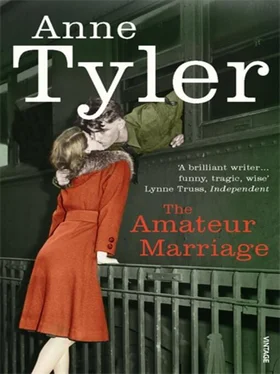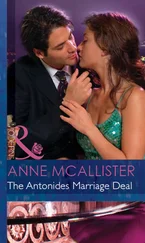In high school it seemed that each boy she fell for had been more challenging, more daunting than the one before. She would start out assuming that surely this new boy would never give her a glance, but then he did and they would date for a time until gradually she would grow restless, and somebody else would catch her eye, someone supposedly unattainable, but even so… Now when she reviewed her past it was like gazing down a long flight of stairs. Sweet, nebulous Rodney stood at the bottom, and Roy Cannon — senior class president, football captain, most-sought-after boy in her school — stood at the top, his neck so big and muscular that it was almost indistinguishable from his mighty shoulders. Roy had gone into his uncle’s used-car business after graduation, but by then Pauline’s enthusiasm was fading. She began to notice how loud his voice was; in a suit instead of a football uniform, his neck seemed grotesquely misshapen. When she broke up with him, though, she had no one new on the horizon — a first. (She was out of school herself by that time, and working in her father’s office, where meeting boys was more difficult.) She had no one to say goodbye to when the war began, and although some might say that was fortunate, she didn’t feel fortunate. In that first, feverish rush after Pearl Harbor she saw couples embracing everywhere she looked, boys standing outside recruitment offices with girls clinging proudly, bravely to their arms, but Pauline was all by herself.
Except for Michael.
Was that the whole explanation? That she had just wanted a boy of her own to send off to war?
But also he’d been so kind and so handsome, and she had seen something so fine in his face. Well, he was fine! He was a decent, sober, hardworking man, and she could have done a lot worse, as she often reminded herself.
Still, during their courtship she had begun to notice certain flaws in him. She noticed and yet did not notice; she put them out of her mind. When he didn’t get her jokes, when he sacrificed her feelings to his mother’s feelings, when he showed a lack of imagination, when he criticized one of her friends, she gave a kind of mental blink and persevered in her original vision of him: he was the romance she had been waiting for all her life. And didn’t everyone agree? They were such a perfect couple! So young, so attractive, so star-crossed, so tragic! He was leaving to fight for his country! She was staying home to wait for him! The radio was playing “I’ll Never Smile Again” and the war was raging in Europe and the world was trying to tear them apart, but in the end they would prevail!
And so she had steadily, stubbornly, pigheadedly continued pursuing the wrong course. Oh, she could see that clearly enough in hindsight. She had dug herself in deeper and deeper, promising to write daily when she detested writing, when there was nothing new to tell a person if you had to write him every single blessed never-ending day of the week and when his own letters were infinitesimally detailed accounts of mock battles in which so-and-so was behind such-and-such a tree, so-and-so on the right flank, so-and-so on the left, on and on and on… And promising not to see other men when she was bored half out of her mind, alone and without entertainment, and the city was teeming with good-looking soldiers and she was too young for this! This was such a waste!
Till finally she had thought, I’ll end it. I’ll write him and end it; what do I care? What does it matter what people will say?
While she was still choosing just the right words, though, Michael had his accident. You can’t jilt a man in a hospital bed. She would wait a bit. Hold off writing her letter till he was on his feet again. But instead he was shipped home. He alighted from the train with deep new lines pulling down the corners of his mouth although he was barely twenty-one, and his khakis were so crisp and authoritative, and his limp so stirring; and Pauline was the soldier’s young sweetheart running toward him in her summer dress. When he let his cane fall where it might and caught her up in his arms and asked if she would marry him, was it any wonder she had said yes?
Even then it had not been too late to back out. She could still call it off! And almost had, half a dozen times, including the very last possible minute before the wedding. But here she was, somehow, all these years later.
She chafed daily at his failings: his rigidity, his caution, his literal-mindedness, his ponderous style of speech, his reluctance to spend money, his suspicion of anything unfamiliar, his tendency to pass judgment, his limited understanding of his own children, his uncharitable attitude toward people down on their luck, his dislike of all social occasions, his stodginess in bed, his magical ability to make her seem hysterical, his infuriatingly patient “Now, Poll,” whenever she was upset, his fondness for reminding her during quarrels of weaknesses she had too gullibly confessed at happier moments. And yet underneath, she knew that none of these was the real problem. The real problem was that they were mismatched. They simply never should have married each other.
Although whenever he voiced this thought himself, it cut her to the heart. He would be willing to give her up? He could picture a life without her? Then she would see that perhaps it was not that he was too slow but that she was too quick and impatient, not that he was too deliberate but that she was too reckless, and so forth. And she would dissolve into tears and wish she could do it all over again — meet him, fall in love, marry him — but this time, properly valuing him.
The master bedroom was her pride and joy, the showpiece of the house. In the living room she’d had to make concessions to Mother Anton (Old Country lace doilies and hand-embroidered runners, a crucifix above one door), but step into the master bedroom and you knew you had entered the modern age. The carpet was a beige wall-to-wall, the furniture ash-blond wood with cream Formica tops and asymmetrical slashes of chrome for the drawer pulls. The bed had a white “crackle ice” vinyl headboard and a spread in a vibrant abstract print of red and yellow and royal blue. Over the bed was a framed Picasso that Michael always referred to as Three Musicians After a Train Wreck, and over the vanity a mirror shaped something like a boomerang.
The idea was that every horizontal surface should be bare, with perhaps a single tasteful object here and there for decoration, but that was easier said than done when you had small children. At the moment the bureau top was hidden beneath a mound of laundry waiting to be sorted, and a drift of Lindy’s paper dolls, and the swim goggles that George had been hunting for this morning. Also, Pauline had a habit of strewing clothes around when she was dressing. Right now she was dressing for an afternoon canasta party, and first one thing didn’t look right on her and then another; so there were skirts and tops and slacks piled on the bed and shoes pointing every which way across the carpet. She had just about decided on a pink V-necked blouse, but she couldn’t think what to wear with it, and she was stepping out of a too-tight skirt when the phone rang. Half staggering, her feet entangled in pleats, she made a lunge for the extension on the nightstand. “Hello?” she said.
“Pauline?”
It was Alex.
“Oh!” she said. She looked toward the door, which was almost shut but not quite. “What do you want?” she asked.
She hadn’t meant to sound so blunt. She pressed her fingers to her lips. He didn’t take offense, though. He said, “Here I had thought I was thawing a steak, but just now when I unwrapped it I found out it was ground beef.”
“Ground beef,” she said, and then, audaciously, “Didn’t Adelaide label her freezer packs?”
Читать дальше












